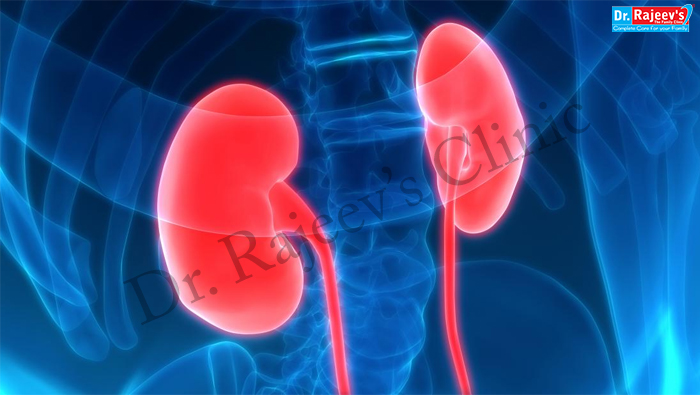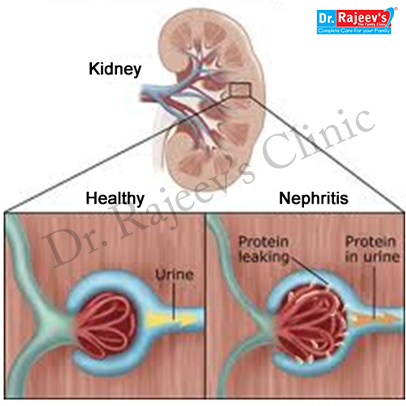

To understand kidney problems such as nephritis, it's helpful to start with some background on what the kidneys are and what they do.
The kidneys are two bean-shaped, fist-sized organs found just under the ribs on the left and right sides of the spine. They remove impurities and extra water from the blood, filtering 120-150 quarts of blood a day, according to the National Institute of Diabetes and Digestive and Kidney Diseases.
Each kidney consists of thousands of structures called nephrons, where the actual blood filtering takes place. In the nephron, a two-step cleaning process separates what the body needs to keep from what it can get rid of.
A filter called the glomerulus catches blood cells and protein, sending water and waste to a second filter, called a tubule. The tubule captures minerals. After that, what remains leaves the body as urine.
Nephritis describes a condition in which the kidney's tubules and nearby tissues become inflamed, which can lead to kidney damage.
When kidneys are damaged, they don't work properly. Waste builds up and causes serious health problems. If the condition is severe enough, or lasts long enough, it can result in kidney failure.

Acute glomerulonephritis: This form of nephritis can develop suddenly after a serious infection, such as strep throat, hepatitis, or HIV. It can also be caused by lupus and less common conditions such as Goodpasture syndrome or granulomatosis with polyangiitis (GPA). It requires prompt medical attention to prevent kidney damage.
Alport Syndrome: This disease can lead to kidney failure, as well as vision and hearing problems. It tends to run in families and is usually more severe in men.
Chronic glomerulonephritis: Developing slowly, and with few symptoms in the early stages, this disease can cause serious kidney damage and kidney failure. It may run in families, or develop after a sudden case of disease.
IgA nephropathy: One of the most common forms of nephritis, aside from those linked to diseases like diabetes and lupus. It develops when deposits of antibodies are formed in the kidney and cause inflammation.
More common in men than women, it is rarely found in young people because early symptoms are easy to miss. It is often treated with blood pressure medications.
Interstitial nephritis: Often developing very rapidly, this form of nephritis is usually caused by medications or infections. It affects the part of the kidney known as the interstitium. If patients are quickly taken off the medication causing the problems, a full recovery is possible in a few weeks.
 There are many different causes for nephritis. In some cases, the cause may not be clear. Nephritis and kidney disease can run in families, which suggests a possible genetic link. Infections, such as HIV and hepatitis B or C, can also cause nephritis.
There are many different causes for nephritis. In some cases, the cause may not be clear. Nephritis and kidney disease can run in families, which suggests a possible genetic link. Infections, such as HIV and hepatitis B or C, can also cause nephritis.
As many as 60 percent of those diagnosed with lupus, an autoimmune disease, also develop nephritis. As a result, there may be a connection with immune system problems.
In some cases, medications like antibiotics damage the kidneys, leading to nephritis. Taking too many painkillers, non-steroidal anti-inflammatory drugs, and water pills can also cause nephritis.
The most important risk factors for kidney disease are:
African-Americans, Hispanics, Native Americans, Alaskan Natives, Asians, and Pacific Islanders are more likely to develop kidney problems than Caucasians.
Symptoms of nephritis are usually not severe in the early stages. However, to protect the kidneys from permanent damage, it's important to seek medical attention if these symptoms are present:
Nephritis may first be detected by routine blood or urine tests. Finding protein in the urine can indicate that the kidneys are not working properly. A blood test that measures a waste product in the blood called creatinine also sheds light on kidney health.
Homeopathic Medicine:
Apis Mellifca, Arsenic Album, Cantheris, Terebinth.
RL49
https://bit.ly/3ouWKwS